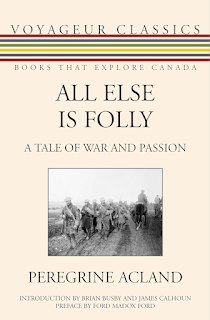In my twenties, the 'twenties – by which I mean the 1920s – seemed the height of art, film, decadence, glamour, and romance.
I'm not sure I was wrong.
The decade also saw the the height of the novel, though perhaps not in Canada. My CanLit profs assigned works by Mazo de la Roche, Frederick Philip Grove and Martha Ostenso. How they paled beside Faulkner, Fitzgerald, Forster, Hemingway, Joyce, Wharton, and Woolf! But then, what might one expect from a country of a mere nine million?
Time has passed, during which I've come to recognize that the keepers of the canon have messed up in so very many ways.
As we're now half-way through the 2020s, I present this list of the nine best Canadian novels of the 1920s. Not one of the authors received so much as a passing mention in my CanLit courses.
By no means definitive, I've limited the list to nine titles because I've yet to read Douglas Durkin's The Magpie (1923) and They Have Bodies (1929) by Barney Allen (Sol Allen). From what I know of the two, it's likely that at least one would round out a top ten. I'll be making a point of reading both this year and will keep you informed. But for now:
The Thread of FlameBasil King
New York: Harper, 1920
In the aughts and tens of the last century, King topped American bestseller lists with The Inner Shrine, The Wild Olive, and The Street Called Straight, though his two best books date from the twenties. This one involves a man who lost his memory whilst fighting in the Great War, but don't let that put you off.
Basil King
New York: Harper, 1921
Bertand W. Sinclair
Toronto: Ryerson, 1922
The most cutting Canadian novel of the decade, it has three targets: the self-help industry, corporate culture, and gender norms. Criticisms of the first two bring insight, but that of the last makes Pagan Love one of the most intriguing Canadian novels of the twentieth century.
Winnifred Eaton
New York: Watt, 1924
Ottawa: Graphic, 1924
Isabel MacKay
Toronto: Allen, 1926
The great Canadian novel of the Great War. Written by one who was there, it is highly autobiographical and would've been banned had the author's father not been so well connected. Praised by Ford Maddox Ford and Frank Harris.
Or is that They Have Bodies?
I aim to find out.





























































